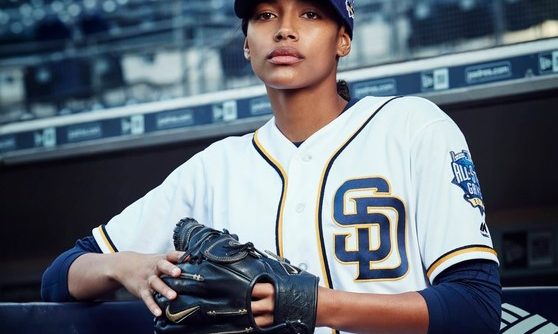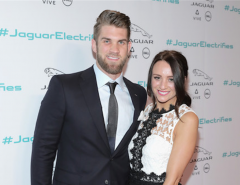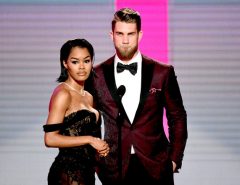There have been 159 pitching debuts during the 2016 season thus far. The ERAs of these pitchers range from 0.00 to 40.50. But, of course, none of them are women. Pitch, the newest fall FOX drama, imagines a Major League Baseball where this isn’t the case — an imagination that leads them to a worthwhile pilot episode and hopefully beyond.
Pitch centers around Ginny Baker, played by Canadian actress Kylie Bunbury, as the first woman to start a game on a Major League mound. Ginny’s father (Mike Beach), a former player who only ever made it as far as the minor leagues, developed Ginny as a pitcher and is responsible for teaching her the crux of her success: the screwball.
The pilot opens with Ginny waking up in a sunlit hotel room near Petco Park, flowing with fruit baskets from Ellen Degeneres and Hillary Clinton. The San Diego Padres, in need of a spot starter, had called Ginny up from Triple A. She made her way from her hotel room, to the lobby, to the car, in a music montage peppered with commentary from Katie Nolan, Ken Rosenthal, and Colin Cowherd, and I was already prepared to go to war for Ginny Baker and all of womankind.
The show has been vocal about its intentions to “inspire women,”, almost to a fault. The crowds of hundreds featuring droves of little girls that gather for Ginny outside her hotel, outside the stadium, and in the park bring these intentions to light. The inspired girls who were portrayed were every reason Ginny was ever written up in the first place: to show girls that they have a fighting chance where men dominate. Ginny, for the most part, was worthy of their praises.
The cute signs these girls held did get increasingly cheesy and overdone, though. At one point, Ginny looks up at signs in the stadium reading “Girl Power,” and “We’re Counting on You,” signs that, of course, sent her into a panic. Maybe leave the “The Entire Fate of Our Gender Rests in Your Hands” signs in the car and the sentiment out of the script.
Ginny’s start is called by John Smoltz and Joe Buck, who, if you’re wondering, still hasn’t shaved his terrible beard. Ginny, who has been preparing for this moment since she was little, stands on the mound with the world watching, and starts playing catch with the backstop. The manager comes out, and the unwriteable happens: Ginny asks to be taken out. Nope. No thanks, Pitch writers.
It isn’t uncommon for an MLB mound to be a bubble of chaos when someone’s on it for the first time. But thousands of pitchers have been able to pop that bubble without demanding to be taken out. Tyler Moore got through it, for position-players-pitching sake. What would make Ginny any different from those men? Someone who’s worked her whole life succeed in baseball against the odds doesn’t ask her new skipper to take her out of a baseball game because she’s struggling. There’s no justification for having Ginny, who’s had to constantly prove herself — a competitor by nature if not by necessity — ask to be pulled from a game after 10 pitches.
Most players would be sent down after such a start, but to club owner Frank Reid (Bob Balabanas), Ginny isn’t most players. He overrode manager Al Luango’s (Dan Lauria) call to send her down. He knew what Ginny’s call up meant; He gave her number 43, “one above Jackie.” The show consistently compared Ginny to Jackie Robinson, which may or may not have been fair. Jackie Robinson wasn’t greeted by adoring crowds when his contract was selected.
The comparisons weren’t likely meant to extend to race (intentionally, anyway), but they could have. Ginny is breaking a barrier by being a woman in baseball, specifically, a black woman in baseball. So far, the show hasn’t directly referenced it. But there are little black girls in the stands cheering for Ginny, and it means something for them to have representation in sports, let alone Major League Baseball.
So far, Ginny, as a character, is worthy of the cheers, even if that doesn’t initially show itself in her debut. Ignoring her episode on the mound, Ginny is focused and self-assured. It’s clear why she’s made it as far as she has. So maybe drop a few of the references to how attractive she is. She’s there to win and her backbone is apparent. Just in case that ever falters, Amelia Slater (Ali Larter), Ginny’s power agent, is smart, no-nonsense, and ready to do any strong-arming for her client. Slater has “never even seen a baseball game” but she compliments well as a strong female character.
Ginny’s father is present, but mostly in flashbacks, since, y’know, he’s dead. After cycling through the seven stages of grief when his death is revealed in a twist, you might find that his absence will be disappointing. It removes the father-daughter dynamic. However, it does slightly alter the meaning of her start and her development through the minors. She’s not Bryce Harper, who can call his dad whenever he feels like his swing could use a tweak.
Ginny’s swing, on the other hand, isn’t even on display in the pilot. Despite being on a National League team, there are no mechanics for Harper’s dad to critique from the couch. Close up, slow motion shots of Ginny’s pitching motion—something many sports shows and movies shy away from or do poorly — were shown as a worthy consolation prize. I’m no Mike Maddux, but her form is believable. That’s by design. Bunbury worked with Greg Olsen, a former Dodger, to get in working shape and look less ridiculous than Carter Capps.
There have been 159 pitching debuts in the majors this year, and not one of them has been a woman. I remember hitting crisis mode as a five-year-old (wearing a backwards hat a la Ken Griffey) upon realizing a girl wouldn’t make it to the majors. To see Ginny succeed on a major league mound and focus in despite detractors is genuinely invigorating. It had all of the show’s foibles in a back seat.
A woman, who would have been kept out for that very descriptor, is in a place where thousands of men have been before and no other woman has. Even if it is only in a show, it makes the arrivals of the Kelsie Whitmores and Stacy Piagnos of the world feel closer. That’s reason enough to keep watching. To quote Katie Nolan, “if that upsets you, well, maybe you’re just getting your period.”
Tags: Nationals, Nats, Pitch, Washington Nationals





Leave a Reply